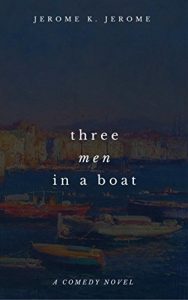Three Men in a Boat (To Say Nothing of the Dog), published in 1889, is a humorous account by Jerome K. Jerome of a boating holiday on the Thames between Kingston and Oxford.
The book was initially intended to be a serious travel guide, with accounts of local history along the route, but the humorous elements took over to the point where the serious and somewhat sentimental passages seem a distraction to the comic novel. One of the most praised things about Three Men in a Boat is how undated it appears to modern readers, the jokes seem fresh and witty even today.
The three men are based on Jerome himself (the narrator J.) and two real-life friends, George Wingrave (who went on to become a senior manager in Barclays Bank) and Carl Hentschel (the founder of a London printing business, called Harris in the book), with whom he often took boating trips. The dog, Montmorency, is entirely fictional, but "as Jerome admits, developed out of that area of inner consciousness which, in all Englishmen, contains an element of the dog." The trip is a typical boating holiday of the time in a Thames camping skiff. This is just after commercial boat traffic on the Upper Thames had died out, replaced by the 1880s craze for boating as a leisure activity.
The book was initially intended to be a serious travel guide, with accounts of local history along the route, but the humorous elements took over to the point where the serious and somewhat sentimental passages seem a distraction to the comic novel. One of the most praised things about Three Men in a Boat is how undated it appears to modern readers, the jokes seem fresh and witty even today.
The three men are based on Jerome himself (the narrator J.) and two real-life friends, George Wingrave (who went on to become a senior manager in Barclays Bank) and Carl Hentschel (the founder of a London printing business, called Harris in the book), with whom he often took boating trips. The dog, Montmorency, is entirely fictional, but "as Jerome admits, developed out of that area of inner consciousness which, in all Englishmen, contains an element of the dog." The trip is a typical boating holiday of the time in a Thames camping skiff. This is just after commercial boat traffic on the Upper Thames had died out, replaced by the 1880s craze for boating as a leisure activity.






